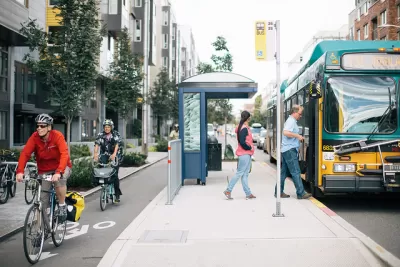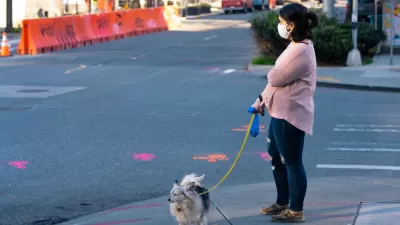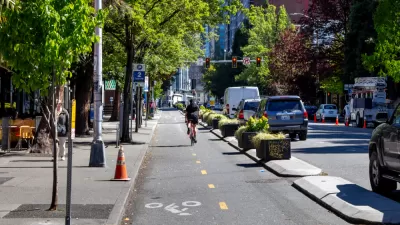Transit advocates thought a public-private partnership to modernize transit shelters and enhance the public realm was a done deal.

Seattle has put a public-private partnership that would have modernized the city's transit shelters "on ice," potentially scuttling between $97 million and $167 million in revenue over 20 years.
"The city had selected Intersection, a winning bidder, which promised installation of modern transit shelters and high-tech information and WiFi kiosks throughout Downtown Seattle and South Lake Union at no cost to the city. Intersection had also offered to pay the city between $97 million and $167 million over 20 years as compensation for sole operational rights," reports Stephen Fesler.
Fesler reports that Mayor Jenny Durkan is responsible for putting the project "on ice some time between late last year and early this year." The news came after The Urbanist spoke with Seattle Department of Transportation official, who report that "priorities had since changed and that the contract had been put on an indefinite hold, likely meaning permanent cancellation."
The article includes a lot more detail about the deal that would have created the public-private partnership, the city's intended private sector partner, and the look and feel of the proposed transit shelters.
FULL STORY: Durkan Torpedoes Transit Shelter Modernization Plan, Forgoing $97 Million Or More In Revenue

Planetizen Federal Action Tracker
A weekly monitor of how Trump’s orders and actions are impacting planners and planning in America.

Chicago’s Ghost Rails
Just beneath the surface of the modern city lie the remnants of its expansive early 20th-century streetcar system.

San Antonio and Austin are Fusing Into one Massive Megaregion
The region spanning the two central Texas cities is growing fast, posing challenges for local infrastructure and water supplies.

Since Zion's Shuttles Went Electric “The Smog is Gone”
Visitors to Zion National Park can enjoy the canyon via the nation’s first fully electric park shuttle system.

Trump Distributing DOT Safety Funds at 1/10 Rate of Biden
Funds for Safe Streets and other transportation safety and equity programs are being held up by administrative reviews and conflicts with the Trump administration’s priorities.

German Cities Subsidize Taxis for Women Amid Wave of Violence
Free or low-cost taxi rides can help women navigate cities more safely, but critics say the programs don't address the root causes of violence against women.
Urban Design for Planners 1: Software Tools
This six-course series explores essential urban design concepts using open source software and equips planners with the tools they need to participate fully in the urban design process.
Planning for Universal Design
Learn the tools for implementing Universal Design in planning regulations.
planning NEXT
Appalachian Highlands Housing Partners
Mpact (founded as Rail~Volution)
City of Camden Redevelopment Agency
City of Astoria
City of Portland
City of Laramie




























